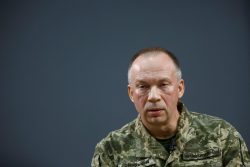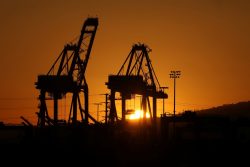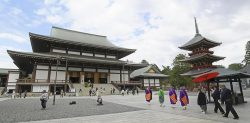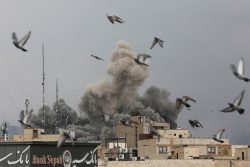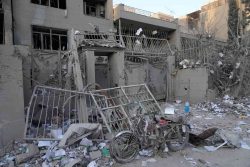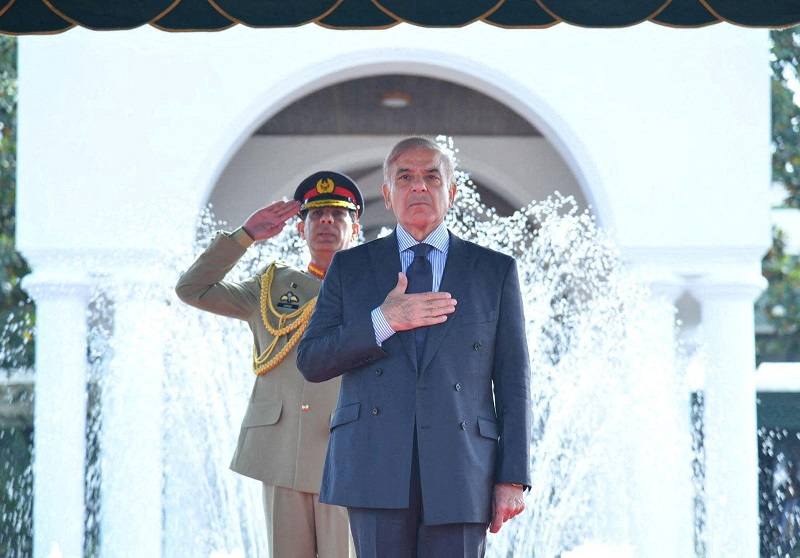
Pakistan’s Prime Minister Shehbaz Sharif gestures during the guard of honour ceremony at the Prime Minister house in Islamabad, Pakistan April 12, 2022.
12:31 JST, April 16, 2022
ISLAMABAD, April 15 (Reuters) – Pakistan’s new government on Friday decided not to roll back billions in fuel subsidies for the time being despite the strain on public funds, citing the possible backlash if it were to raise fuel prices just days after taking power.
Former premier Imran Khan, who was ousted in a confidence vote earlier this week, announced a cut in petrol and electricity tariffs in February, despite soaring global prices, in a bid to win back popular support.
That measure, estimated at 373 billion Pakistani rupees ($2.1 billion), has stretched government finances in a way that cannot be sustained, the finance ministry’s top civil servant said. It has also endangered an ongoing International Monetary Fund rescue program.
“I have … decided not to hike fuel prices in the public interest,” Shehbaz Sharif, the new prime minister, said at a dinner in Islamabad on Friday night.
People would curse the new government just three days after it came to office if it took such a step, he said.
Earlier, officials had warned of the fiscal fallout of continuing the subsidies.
“The relief package will add to the fiscal deficit which we cannot afford at the moment,” Finance Secretary Hamed Yaqoob Sheikh told Reuters.
“Either it has to be rolled back or compensating reductions in other expenditures would be required to ensure that the primary balance agreed with the IMF is achieved.”
The primary budget balance excludes debt repayment obligations.
The fiscal deficit could go as high as 10% of gross domestic product, according to new Prime Minister Shehbaz Sharif’s top economic adviser Miftah Ismail, widely expected to be named finance minister.
“We have been discussing this before (with the previous government) and are discussing it again with the new government as well,” a finance ministry official told Reuters, speaking on the condition of anonymity.
The officials are proposing spreading the rollback of the subsidies over two to three months to soften its impact, he said, adding that the decision was now with the new political leadership.
IMF bail out
Pakistan is in the midst of a $6 billion IMF bailout program and has yet to clear its seventh review, which would release over $900 million and unlock other funding that depends on the fund’s clearance.
The seventh review started in early March, but no agreement had been reached before the collapse of Khan’s government.
A reversal of the fuel subsidies will be politically sensitive for a new government trying to shore up popular support at a time when inflation is running at 12.7%.
“Either the new government can raise prices, which will be politically costly, or they could cover the deficit by reducing other non-development expenditure, which will prove politically difficult,” said Kaiser Bengali, a Pakistani economist who has previously held a number of government advisory roles.
The country’s Oil and Gas Regulatory Authority (OGRA) advised the government to scrap the subsidies and raise prices effective Saturday, according to sources in the regulator. It gave two scenarios: one where the government continued to keep levies and tax at zero, and one where they would be reimposed to increase revenues.
Diesel fuel prices should be hiked by over 35% from 144 rupees ($0.8) to 195 rupees ($1.1) per liter, the sources said. This would increase to 264 rupees ($1.5) per liter if levies and tax were re-introduced – an 83.2% rise in price.
Petrol, currently at around 150 rupees ($0.83), should be raised by 14% to 171 rupees per liter. The price, if levies and tax are included, would shoot up 57% to 235 rupees ($1.3) per liter.
The government is not bound to implement this advice, and it was not immediately clear what decision the government would make.
Sharif is yet to announce his cabinet, but Ismail and the spokeswoman for Sharif’s party, Marriyum Aurangzeb, did not immediately respond to Reuters’ requests for comment.
($1 = 181.00 Pakistani rupees)
Top Articles in News Services
-

Survey Shows False Election Info Perceived as True
-

Hong Kong Ex-Publisher Jimmy Lai’s Sentence Raises International Outcry as China Defends It
-

Japan’s Nikkei Stock Average Falls as US-Iran Tensions Unsettle Investors (UPDATE 1)
-

Japan’s Nikkei Stock Average Touches 58,000 as Yen, Jgbs Rally on Election Fallout (UPDATE 1)
-

Japan’s Nikkei Stock Average Rises on Tech Rally and Takaichi’s Spending Hopes (UPDATE 1)
JN ACCESS RANKING
-

Producer Behind Pop Group XG Arrested for Cocaine Possession
-

Japan PM Takaichi’s Cabinet Resigns en Masse
-

Man Infected with Measles Reportedly Dined at Restaurant in Tokyo Station
-

Israeli Ambassador to Japan Speaks about Japan’s Role in the Reconstruction of Gaza
-

Videos Plagiarized, Reposted with False Subtitles Claiming ‘Ryukyu Belongs to China’; Anti-China False Information Also Posted in Japan



